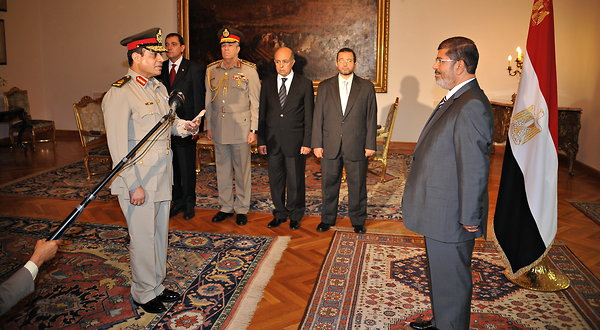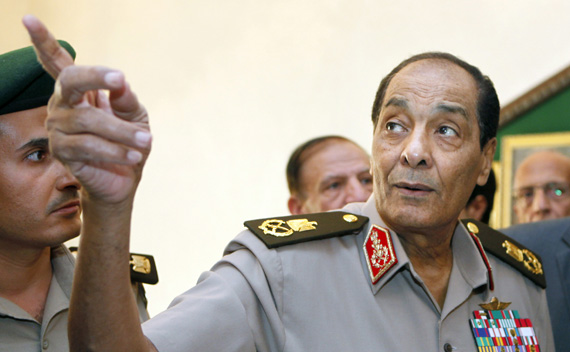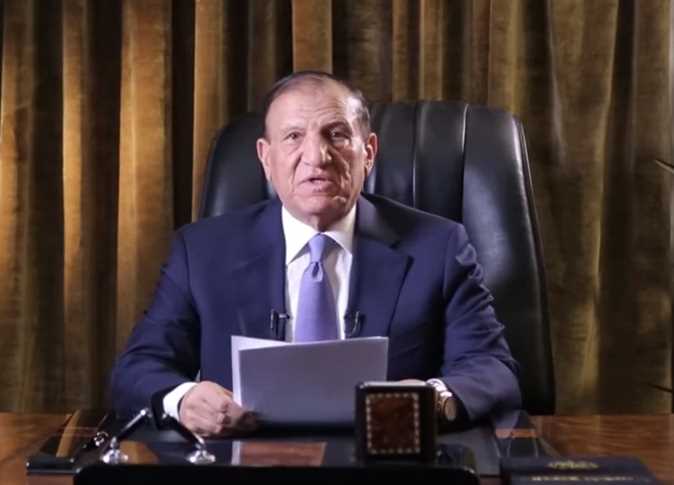
“Breaking: Mohamed Morsy is the president of the Egyptian Republic,” said activists on social media websites jokingly as an expression of Morsy’s assertion of power after catching the country off guard by sending the head of the Supreme Council of Armed Forces Mohamed Hussein Tantawi and Chief of Staff Sami Anan to retirement Sunday.
In an unprecedented reshuffle of the 19-member SCAF, Morsy replaced Tantawi, who has been defense minister for 22 years, with current Military Intelligence Chief Abdel Fattah al-Sisi who was promoted two ranks and now heads the ministry and the armed forces, the presidency’s spokesperson Yasser Ali announced on Sunday. The president also promoted Sidqy Sobhy, the third field army leader to be the military chief of staff, while Mohamed al-Assar was appointed as deputy defense minister. Additionally, Head of Naval Forces Mohab Mamish was assigned as leader of the Suez Canal Authority.
Political and military experts say that Morsy’s radical decision to cast aside Tantawi and Anan, who remained on top of the military institution for decades, indicates that the president is consolidating his power over the military establishment in a tactful manner, without necessarily ending the legacy of the military state. For one, the promotion of second rank military officers is considered a tactical move to preempt any possible opposition from the army, they argue.
“It’s a takeover of military rule rather than the end of military rule. This is another phase of authoritarian rule,” says Robert Springborg, a professor at the Department of National Security Affairs at the Naval Postgraduate School and an expert on the Egyptian military institution.
“The military is now serving as an instrument for the Muslim Brotherhood. Morsy’s move institutionalizes normal civilian control over the military,” he added.
Springborg argues that “the way it was done indicates that the Brothers have a plan from before” and that last week’s attack on Egypt’s border with Gaza and Israel in Sinai paved the way for the move.
Sixteen Egyptian soldiers were killed by armed men on 6 August at the Egyptian border with Gaza and Israel. The attack fueled criticism of the lack of military readiness and a failing state in the strategic peninsula.
As a result, Morsy replaced intelligence chief Mourad Mowafy with Abdel Wahed Shehata and appointed Hamed Zaki as head of the presidential guard, while North Sinai Governor Abdel Wahab Mabrouk has been sacked from his post along with the head of the Central Security Forces. Furthermore, Hamdi Badin, commander of the military police, was also removed from his position.
Morsy had to first guarantee authority over the Presidential Guard and Central Security Forces to defend the president against any street riots that might take place as a reaction to the military leaders shuffle, Springborg told Egypt Independent. “They [Muslim Brothers] prepared the ground.”
Professor Emad Shahin, who teaches political science at the American University in Cairo and who specializes in Islamist movements, also thought the reshuffling was well calculated by Morsy. “The reshuffling is very smart, as it avoids escalation and ensures the loyalty of the military establishment. Now the military institution is under the authority of the elected president,” said Shahin. He agreed with Springborg that the Sinai attacks “served Morsy” as he is viewed as reacting strongly by holding security officials accountable.
Even though this is considered a drastic rearrangement of Egypt’s military leadership, Morsy didn’t entirely dissolve the SCAF and also tactically kept Assar in place in order to ensure a positive reaction from the military especially that leaders of the second armies are in place, Shahin argued.
Additionally, Morsy appointed Tantawi and Anan as his advisors in addition to awarding Tantawi with the Nile Medal, the highest state honor in Egypt, and Anan with the State Medal. Their exit from SCAF is deemed highly honorable, as well as safe.
The whole move has been made possible today by Tantawi’s growing unpopularity during the past year and half among the middle and lower ranks of the army and their dissatisfaction with the top leaders’ performance, Springborg said.
Egypt has been through a rocky transition period under the rule of the SCAF, tainted by political and social unrest, a considered state failure and the killing of more than 100 protesters across several occasions. The most prominent chant in any protest after Mubarak’s step down in February 2011 has been “down with military rule.”
“With Morsy’s ascent to power, the middle ranks knew there is a new order and they had to think about where to align themselves. They had to work with the Brotherhood,” said Springborg, adding that even the new Minister of Interior Ahmed Gamal al-Din used to be the mediator between the Brotherhood and the ministry before his appointment, which indicates a favorable relationship between them.
In addition to Assar, who is known to have favorable relations with the US, Sisi was one of the names on the top of the list for potential Tantawi successors among American circles, said Springborg.
Choosing Sisi who headed the military intelligence and pushing him two ranks up to replace Tantawi as the military general commander also casts doubts, experts said.
Political expert Sherif Younis says that the choice of the head of the military intelligence as the new defense minister and deputy prime minister for arming affairs Assar as the new deputy defense minister are attempts by Morsy to guarantee that the two most strategic elements of the military, intelligence and weapons, stay under his control, in case his move created rifts within the military.
“The intelligence has all the folders of the military and Assar has the arming, so this can be a partial and peaceful coup,” says Younis.
Conflicting accounts have emerged as to whether Morsy consulted with Egypt's military leaders before ordering their retirement from the SCAF. "The decision was based on consultation with the field marshal and the rest of the military council," Assar told Reuters.
However, Amr el-Shobaki, a researcher at Al-Ahram Center for Political and Strategic Studies, said Sunday that Morsy agreed on the decrees with members of the SCAF other than Tantawi and Anan, including Sisi.
According to Younis, even with reports that Morsy coordinated with the military leaders before announcing his decisions, they were probably forced into playing along as they were left with no other option. Younis says that, unless there is a strong reaction within the military, the move puts Tantawi and Anan, who ruled the country since Mubarak’s ouster last year, on the margins of the political scene as mere honorary advisors.
Steven Cook, senior fellow for Middle Eastern studies at the Council on Foreign Relations, agrees, saying that even if Tantawi and Anan knew before hand, they would have no way to oppose it. "It is apparent that Morsy fell that he can't really do his job in an environment where the military is ruling and hence had to cultivate another rank of officers to consolidate his power." Cook says that while the US administration is surely taken by surprise by the reshuffles, especially given its close relation with Anan in particular, it has also been concerned with the multiple powers ruling the country.
The decisions will change the relationship between the military and civilian authorities, Younis asserted, adding that the face of the new relationship will be revealed in time.
“There are now people who owe their new positions to the revolution and to Morsy; there won't be the same level of rivalry but the military will not turn into a toy in Morsy’s hands as well. The strength of the military institution [gets] in the way,” says Younis.




